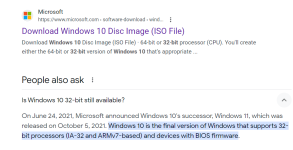- Joined
- May 6, 2019
- Messages
- 11,255
- Points
- 83
The Epic Games Launcher will no longer support Windows 7, Windows 8, or Windows 10 (32-bit) starting in June 2024, Epic Games has announced.
See full article...
See full article...
XP64 was absolutely horrendous and not just for games. Unless you had more than 4GB of RAM there was no reason to use it.I recall going 64bit since XP x64, yes there were quite a bit of issues running many games but it was still worth it.
That's my reasoning for getting EGS as well. I honestly get the free games and then never install them for the most part.Yeah, not a fan of EGS. I've gotten tons of free games but I don't even play them. The main reason I have it is from getting the Crysis remasters when they launched
If I knew, then I forgot years ago.I didn't even realize there was a 32bit Windows 10.
I didn't even realize there was a 32bit Windows 10.
XP64 was absolutely horrendous and not just for games. Unless you had more than 4GB of RAM there was no reason to use it.
Hey, I though I was the only oneThat's my reasoning for getting EGS as well. I honestly get the free games and then never install them for the most part.
I went with XP64 and must've gotten lucky with it. I don't remember how much ram I had but I know that by the time I retired that rig (still have it in the closet) I had maxed what it could take.
Yeah, not a fan of EGS. I've gotten tons of free games but I don't even play them. The main reason I have it is from getting the Crysis remasters when they launched and maybe a couple of other games that I've since purchased on GOG. Honestly though, I'm shocked it took them this long to drop 32-bit support.
Win11 is 64-bit only, but Win10 has a 32-bit version.If I'm not mistaken, Windows 10 is 64bit only.
No worries. We actually were running the 32bit version on some old HP workstations (~30) for a time because they only had 8GB (or maybe 4GB-I can't remember anymore) of RAM and the hardware was so old I just didn't feel it was worth it to upgrade. Those workstations were in use for roughly 10+ years, SATA II, PCIe 2.0, etc. so I was pretty happy to retire them about 4 years ago but I did get a decent deal for some cheap SSDs to give them a little bump that carried them through their final years.If I'm not mistaken, Windows 10 is 64bit only.

Back in the day I tried every new version of windows as soon as it was possible. Some upgrades seemed more like downgrades.I kept it for a while and skipped Vista, I learned a lot to make software work in windows 7 x64. And yes I had 4GB at the time.
Windows 2000 - Slow and compatibility issues galore both with HW and software, probably the slowest booting windows ever
